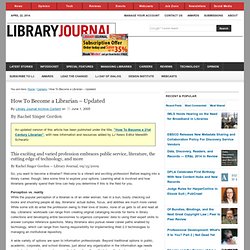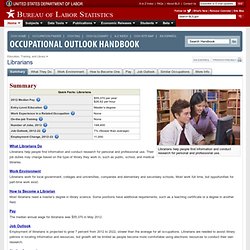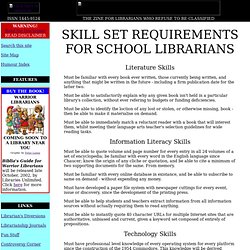

How To Become a Librarian-Updated. By Rachel Singer Gordon This exciting and varied profession embraces public service, literature, the cutting edge of technology, and more By Rachel Singer Gordon — Library Journal, 09/15/2009 So, you want to become a librarian?

Welcome to a vibrant and exciting profession! Before leaping into a library career, though, take some time to explore your options. Perception vs. realityWhile the popular perception of a librarian is of an older woman, hair in a bun, busily checking out books and shushing people all day, librarians’ actual duties, focus, and abilities are much more varied.
A wide variety of options are open to information professionals. If you intend to pursue a career in a traditional library, though, start by browsing the American Library Association (ALA) web site (www.ala.org) to find out about the different types of librarianship and the resources available to you from the national association. Each of these types of libraries employs librarians in multiple subspecialties. Librarians. Librarians’ job duties may change based on the type of library they work in, such as public, school and college libraries.

Librarians help people find information and conduct research for personal and professional use. Their job duties may change based on the type of library they work in, such as public, school, and medical libraries. Duties Librarians typically do the following: In small libraries, librarians are often responsible for many or all aspects of library operations. In larger libraries, librarians usually focus on one aspect of library work, including user services, technical services, or administrative services.
The following are examples of types of librarians: User services librarians help patrons find the information they need. Technical services librarians obtain, prepare, and classify print and electronic library materials. Administrative services librarians manage libraries. Librarians who work in different settings sometimes have different job duties. Skill Set Requirements for School Librarians. Literature Skills Must be familiar with every book ever written, those currently being written, and anything that might be written in the future - including a firm publication date for the latter two.

Must be able to satisfactorily explain why any given book isn't held in a particular library's collection, without ever refering to budgets or funding deficiencies. Must be able to identify the loction of any lost or stolen, or otherwise missing, book - then be able to make it materialise on demand. Must be able to immediately match a reluctant reader with a book that will interest them, whilst meeting their language arts teacher's selection guidelines for wide reading tasks. Information Literacy Skills Must be able to quote volume and page number for every entry in all 24 volumes of a set of encyclopedia; be familiar with every word in the English language since Chaucer; know the origin of any cliche or quotation, and be able to cite a minimum of two supporting documents for the same. Librarian: Educational Requirements to Be a Librarian. Librarians organize and manage collections of books, magazines, newspapers, journals, electronic documents and other data resources.
They also help people find and understand the information they need within the library. Librarians work in a variety of settings, such as academic, public, private, school and specialty libraries. Most library positions entail master's degrees in library science or a specialty of the field. Read on to learn more about becoming a librarian.
Librarian Educational Requirements Undergraduate Degree The path to becoming a librarian begins with an undergraduate degree from an accredited 4-year college or university, which is required for admission into graduate school. Graduate Degree Employers typically prefer to hire librarians who have completed a master's degree program accredited by the American Library Association (ALA). Library management Cataloging Information science Research methods Reference resources Library collections Specialization Career Information.